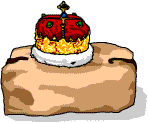A Brief Overview of British Politics...
Created | Updated Dec 3, 2002
Return to the Index Page...
What is Politics...?
Who was Prime Minister...?

British government operates off a system of democracy with a constitutional monarchy, who at present is Queen Elizabeth II, as the head of State. Unlike most countries, the British Constitution is not laid down in one single document. Instead it is a combination of laws and practices, not legally enforcable, but vital to the working of government, that form the Constitution itself.
The Monarchy

Britsh government stability owes much to the monarchy. It has only been interrupted once (the republic of 1649 - 1660, Oliver Cromwell) in over a thousand years. The monarch today is not only head of State, but is also an important symbol of national unity. The monarch's official title is:
Name the Number, by the Grace of God of the United Kingdom of Great Britain and Northern Ireland and of His/Her other Realms and Territories King/Queen, Head of the Commenwealth, Defender of the Faith.
The law states that the monarch is head of the executive branch of the government, head of the judiciary, an integral part of the legislature, commander-in-chief of all the armed forces of the Crown and the 'supreme governor' of the Church of England. However, the power of the monarch has been steadily decreased over the years. They is now uninvolved in governments day-to-day running, they are impartial and act upon the advice of there ministers.
Parliament
British Parliament is made up of the House of Commons, the House of Lords and the monarch in their constitutional role.
The House of Commons
This house is the centre of all parliamentary power. It has 651 elected Members of Parliament1 which represent the local constituences. A general election must be held at least every five years in order to choose government and elect or in some cases re-elect MPs. The election takes the form of a secret ballot where voters are over the age of 18. The simple system of majority voting is used.
The House of Lords
The House of Lords is limited with its power. It can, but rarely does, delay a bill. The principle point of the House is to act as a revising chamber, it will question a bill sent from the Commons and revise it where necessary.
Political Parties
The system of political parties is vital to the working of government. Parties are not registered nor are they formally recognised by law although many candidates belong to one of the three main parties; Labour, Conservative and Liberal Democrat.
